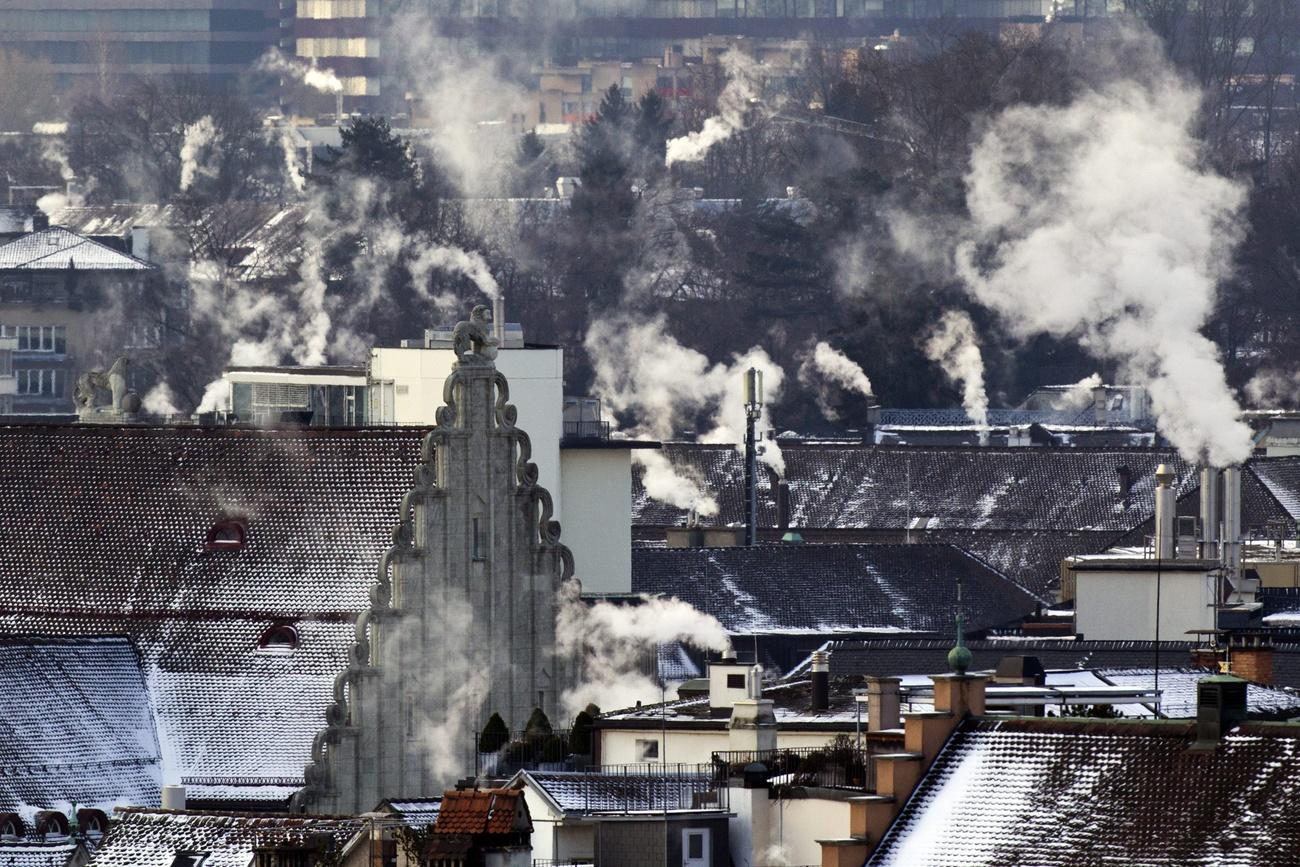Can coronavirus help the environment?

Less smog over China, clearer canals in Venice, better air quality in parts of Switzerland – how much is due to coronavirus measures, and can the climate benefit in the long run?
In Switzerland, everything deemed non-essential has been cancelled or closed. Public transport is running at a minimum, and office workers are telecommuting whenever possible.
“In urban areas we can see an effect of the lockdown measures – specifically in a reduction of nitrogen dioxide (NO2),” says Christoph Hüglin, who researches air pollution at the Swiss Federal Laboratories for Materials Science and Technology (Empa)External link. “But in rural areas, we don’t see an effect. The weather has been such that we already have exceptionally good air quality.”
To get a sense of how the lockdown measures affected the concentrations of NO2 in March, Empa researchers compared the observed levels to predictions based on business-as-usual and meteorology. The data came from monitoring sites around the nation.
In places like Bern and Lugano, there was considerably less NO2 in the air than what would have been expected. But in rural Beromünster near Lucerne, the observed level of NO2 seemed far higher than predicted.

The researchers attribute this to the sensor’s relatively large distance from road traffic, the very low overall concentrations in this rural area, and the uncertainty of the model and measurements at such low values.
Could staying home be worse?
“Aerosol levels might actually increase if people stay home. People want comfort on difficult days, so they might light wood fires, and that creates emissions,” points out Urs Baltensperger, head of the atmospheric chemistry lab at the Paul Scherrer InstituteExternal link – a part of the Swiss federal technology institutes.
In addition, there was an influx of Sahara dust that blew into Switzerland in late March. These particles, along with lower temperatures and a lack of wind, can result in more clouds as well as air pollution.
In a draft report on the effect of Covid-19 on Swiss air quality, the researchers at Empa conclude that nitrogen oxide (NOx) concentrations “have decreased in most traffic-related sites in Switzerland by up to 50% due to the lockdown measures”. They state that ozone concentrations were low but have “generally increased across Switzerland due to the inverse relationship this pollutant [ozone] has with NOx”.
This shows how hard it is to draw accurate conclusions. Baltensperger says compared to NO2 observations, it’s much harder to get a sense of how the lockdown has affected the concentration of aerosols. Without a detailed analysis of a longer time period, “it’s like reading tea leaves!”
What about those satellite images?
If you look at satellite images showing Switzerland over the past two months, the air appears far clearer post-lockdown measures.
“Nearly all of that is due to a very special weather situation. We’ve never had such a warm winter here,” says Lukas Emmenegger, head of Empa’s laboratory for air pollution and environmental technology. However, he and his team will be studying the satellite images more closely this month as more data on the period following the lockdown becomes available.
But no matter what they discover, Switzerland could never get such impressive results as production powerhouse China – where emissions dropped dramatically during the crisis and are now on the rise again.
Meanwhile, Swiss air quality has profited from Covid-19 measures taken over the border in northern Italy. This is especially true in the southern canton of Ticino, as the Federal Office for the Environment recently told Swiss public broadcaster, SRFExternal link.
A boon for the climate?
The decline in production as well as road and air traffic has optimists hoping that the climate can benefit once Covid-19 is under control. Greenpeace SwitzerlandExternal link, for example, has launched a petition calling for coronavirus-related economic aid to go towards a Swiss Green New Deal.
“Maybe the situation that we have right now will help speed up action in areas that often have an effect on greenhouse gas emissions,” Hüglin, though he and Emmenegger worry that it will take longer than desired.
On the other hand, the pandemic has pushed global warming to the back burner for many decision-makers. The longer the crisis lasts, the worse it’ll be for the environment, according to Martin Grosjean, director of the Oeschger Centre for Climate Research at the University of Bern.
“For the climate it would be best if Covid-19 had never happened. Then we could have concentrated on implementing the Paris Convention,” said Grosjean in an interview with news website WatsonExternal link. The UN Climate Change Conference (COP26) – scheduled for November in Scotland – has been postponed.
What do you think? Let us know in the comments or contact the author of this article on Twitter: @SMisickaExternal link

More
Coronavirus: the situation in Switzerland

In compliance with the JTI standards
More: SWI swissinfo.ch certified by the Journalism Trust Initiative













You can find an overview of ongoing debates with our journalists here . Please join us!
If you want to start a conversation about a topic raised in this article or want to report factual errors, email us at english@swissinfo.ch.